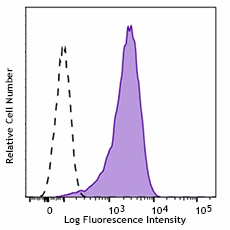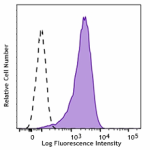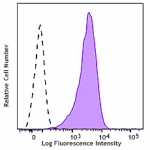- Clone
- W6B3C1 (See other available formats)
- Regulatory Status
- RUO
- Other Names
- Prominin-1, PROM1, AC133
- Isotype
- Mouse IgG1, κ
- Ave. Rating
- Submit a Review
- Product Citations
- publications

-

NCCIT cells were stained with purified anti-human CD133 (clone W3B3C1) (filled histogram) or Mouse IgG1, κ isotype control (open histogram) followed by anti-mouse IgG PE.
| Cat # | Size | Price | Quantity Check Availability | Save | ||
|---|---|---|---|---|---|---|
| 397902 | 100 µg | 273 CHF | ||||
CD133, also known as Prominin-1 and AC133 antigen, is a 120 kD pentaspan glycoprotein with 5 transmembrane domains. CD133 was initially described as a surface antigen specific for human hematopoietic stem cells and as a marker for murine neuroepithelial cells and some embryonic epithelia. Later on, CD133 was found on other stem cells, including endothelial progenitor cells, glioblastomas, neuronal, and glial stem cells. In addition to stem cells for normal tissue, CD133 was found on cancer cells, such as some leukemia cells and brain tumor cells. Although the biological function of CD133 is not completely understood, CD133 has been extensively used as a stem cell marker for normal and cancerous tissues.
Product DetailsProduct Details
- Verified Reactivity
- Human
- Antibody Type
- Monoclonal
- Host Species
- Mouse
- Immunogen
- WERI-RB-1 human retinoblastoma cell line
- Formulation
- Phosphate-buffered solution, pH 7.2, containing 0.09% sodium azide.
- Preparation
- The antibody was purified by affinity chromatography.
- Concentration
- 0.5 mg/mL
- Storage & Handling
- The antibody solution should be stored undiluted between 2°C and 8°C.
- Application
-
FC - Quality tested
- Recommended Usage
-
Each lot of this antibody is quality control tested by immunofluorescent staining with flow cytometric analysis. For flow cytometric staining, the suggested use of this reagent is ≤ 0.5 µg per million cells in 100 µl volume. It is recommended that the reagent be titrated for optimal performance for each application.
- Application Notes
-
W6B3C1 antibody does not compete against AC133, 293C2, clone 7, S16015F, S16016B, or S16016E antibody binding to target.
-
Application References
(PubMed link indicates BioLegend citation) -
- Hermansen SK, et al. 2011. J. Histochem Cytochem. 59(4): 391.
- Rappa G, et al. 2008. Stem Cells. 26(12): 3008.
- Tardito S, et al. 2015. Nat Cell Biol. 17(12): 1556.
- Product Citations
-
- RRID
-
AB_2820062 (BioLegend Cat. No. 397902)
Antigen Details
- Structure
- 120 kD pentaspan transmembrance glycoprotein with 5 transmembrane domains.
- Distribution
-
Hematopoietic stem cells and progenitor cells, fetal liver cells, tissue specific stem cells or progenitor cells such as renal and prostate, a variety of tumor cells.
- Function
- May play a role in cell differentiation, proliferation, and apoptosis.
- Interaction
- NAT8; NAT8B; CDHR1
- Cell Type
- Hematopoietic stem and progenitors, Leukemia, Leukocytes
- Biology Area
- Cancer Biomarkers, Cell Biology, Immuno-Oncology
- Molecular Family
- CD Molecules
- Antigen References
-
- Yin AH, et al. 1997. Blood. 90:5002.
- Miraglia S, et al. 1997. Blood. 90:5013.
- Bühring HJ, et al. 1999. Ann. NY Acad. Sci. 872:25.
- Gene ID
- 8842 View all products for this Gene ID
- UniProt
- View information about CD133 on UniProt.org
Related Pages & Pathways
Pages
Related FAQs
Other Formats
View All CD133 Reagents Request Custom Conjugation| Description | Clone | Applications |
|---|---|---|
| Purified anti-human CD133 | W6B3C1 | FC |
| PE anti-human CD133 | W6B3C1 | FC |
| APC anti-human CD133 | W6B3C1 | FC |
| FITC anti-human CD133 | W6B3C1 | FC |
Compare Data Across All Formats
This data display is provided for general comparisons between formats.
Your actual data may vary due to variations in samples, target cells, instruments and their settings, staining conditions, and other factors.
If you need assistance with selecting the best format contact our expert technical support team.
-
Purified anti-human CD133

NCCIT cells were stained with purified anti-human CD133 (clo... -
PE anti-human CD133

Human peripheral blood mononuclear cells were stained with C... -
APC anti-human CD133

NCCIT cells were stained with anti-human CD133 (clone W6B3C1... -
FITC anti-human CD133

Human peripheral blood mononuclear cells were stained with ...
 Login / Register
Login / Register 








Follow Us